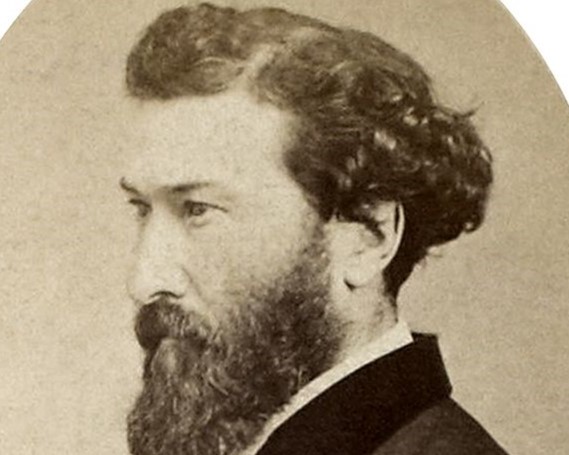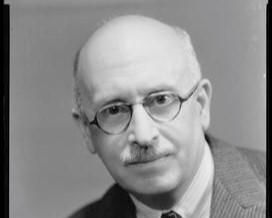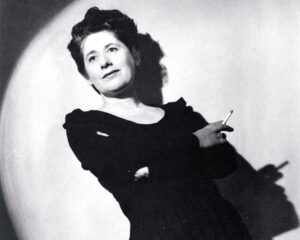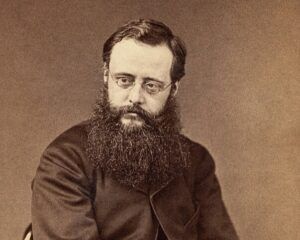Émile Gaboriau: The French Father of Detective Fiction

When it comes to detective fiction, many of us naturally think of Sherlock Holmes’ legendary powers of deduction or Hercule Poirot’s meticulous moustache. But what if I told you that before either of these famous detectives graced the page, there was a Frenchman who had already laid the groundwork for the genre? Enter Émile Gaboriau, the man who can rightly claim to be one of the pioneers of modern detective fiction and the French father of detective fiction.
While his name may not be as familiar to English-speaking audiences as Doyle or Christie, Émile Gaboriau’s contributions to the whodunnit genre are immense. His methodical approach to crime-solving, detailed detective characters, and the complex plotting of his stories helped shape the detective novel as we know it today.
Early Life and Career: From Journalist to Novelist
Émile Gaboriau was born on 9 November 1832 in the small town of Saujon, France, to a relatively modest family. Like many writers of his era, his path to fame wasn’t straightforward. Gaboriau initially trained as a lawyer’s clerk, a job that, while dull, gave him an early exposure to the workings of the French legal system and the various bureaucratic intricacies that would later inform his detective fiction.
However, Gaboriau was not one to be confined to the dusty confines of a legal office. After moving to Paris, he tried his hand at a variety of jobs, including serving as a secretary to the writer Paul Féval and working as a journalist. As it turned out, journalism was an ideal training ground for his future career as a novelist. It sharpened his skills in observation, gave him insight into the latest criminal cases, and honed his ability to write in a clear, engaging style that appealed to a broad audience.
The Creation of Monsieur Lecoq
In 1866, Gaboriau published L’Affaire Lerouge (The Lerouge Affair), his first detective novel and the one that would establish his reputation. The novel introduced the character Monsieur Lecoq, an ambitious, intelligent, and methodical young detective working for the French Sûreté (the equivalent of Scotland Yard in France). Lecoq was a revelation to readers at the time. With his sharp intellect and keen eye for detail, he was unlike any other character in popular fiction.
Monsieur Lecoq was not merely a detective – he was a professional. Gaboriau portrayed him as a meticulous investigator who methodically sifted through clues, interviewed witnesses, and employed logic to solve crimes. Lecoq’s character was based on the real-life Eugène François Vidocq, a criminal turned detective, whose memoirs inspired Gaboriau to create a fictional version of a brilliant investigator.
L’Affaire Lerouge was a sensation in France, and its success prompted Gaboriau to continue writing detective fiction. In subsequent novels, such as Monsieur Lecoq (1868) and Le Dossier 113 (The 113 File) (1867), Gaboriau refined the character of Lecoq and delved deeper into the mysteries that his fictional detective had to unravel. With each novel, Gaboriau’s reputation grew, and so did the appetite of his readers for these thrilling stories of crime and deduction.

A Pioneer of the Detective Genre
It’s no exaggeration to say that Émile Gaboriau was a trailblazer in the world of detective fiction. Long before Sherlock Holmes appeared in A Study in Scarlet (1887), Gaboriau had already established many of the conventions that would come to define the genre.
One of Gaboriau’s greatest contributions was his emphasis on the investigative process. His novels feature painstakingly detailed examinations of crime scenes, the careful piecing together of evidence, and the methodical pursuit of suspects. Gaboriau was fascinated by the minutiae of criminal investigations, and his readers were equally enthralled. In a sense, Gaboriau taught his audience how to “read” a mystery, providing them with the tools to follow the detective’s logic and enjoy the process of deduction.
He also understood the importance of creating a compelling detective. Monsieur Lecoq wasn’t just a plot device; he was a fully realised character with his own ambitions, flaws, and quirks. Lecoq was a master of disguise, able to infiltrate the criminal underworld when necessary, and he had a deep understanding of human nature. But he was also young, a little too eager to prove himself, and occasionally prone to mistakes – qualities that made him both intriguing and relatable.
In this way, Lecoq was a precursor to the complex detective characters that would later dominate the genre. While Sherlock Holmes would become the archetypal “brilliant detective,” Lecoq’s more human qualities set the stage for the nuanced, multi-dimensional detectives of later fiction, from Hercule Poirot to Columbo.
The French Father of Detective Fiction Influenced Later Writers
Émile Gaboriau’s influence on later writers cannot be overstated. While his name may not have the same cachet as some of the greats, many of the detectives and investigative techniques that followed can be traced directly back to his work. His novels were hugely popular in France, but they also gained a readership in Britain and America, where they were translated and serialised.
In particular, Gaboriau had a significant impact on Sir Arthur Conan Doyle. It’s widely acknowledged that Conan Doyle drew inspiration from Gaboriau when creating Sherlock Holmes. Monsieur Lecoq’s deductive abilities, attention to detail, and professional status as a detective clearly prefigure Holmes. In fact, in A Study in Scarlet, Sherlock Holmes even dismisses Lecoq as a “miserable bungler,” perhaps a sly nod from Conan Doyle to one of his literary forerunners. However, despite this offhand critique, it’s clear that Holmes owes a great deal to Lecoq, particularly in terms of his investigative methods.
Beyond Conan Doyle, Gaboriau’s influence can be seen in the broader development of the detective genre. Writers like Agatha Christie, with her creation of Hercule Poirot, and Georges Simenon, with his Inspector Maigret series, both followed in the tradition of creating meticulous detectives whose cases unravel through logical deduction and a deep understanding of human psychology.
A Lasting Legacy
Although Gaboriau’s life was cut short – he died at the age of 40 in 1873 – his impact on literature has endured. His novels may not be as widely read today as those of Conan Doyle or Christie, but his contributions to the whodunnit genre remain invaluable. He was one of the first writers to place the detective at the heart of the story, focusing on the investigation itself rather than simply the crime or the criminal.
What makes Gaboriau the French father of detective fiction is the way in which he combined thrilling plots with detailed psychological portraits of his characters. His criminals were not faceless villains, but complex individuals with motives rooted in human nature. This depth of characterisation set Gaboriau apart from many of his contemporaries and helped elevate the detective novel to a form of serious literature.
So, next time you find yourself engrossed in a detective novel, take a moment to raise a glass to Émile Gaboriau – the Frenchman who helped set the stage for all the sleuths and whodunnits to come. Without Monsieur Lecoq, the literary world would be a far less mysterious place.
Take Care
Shaun


